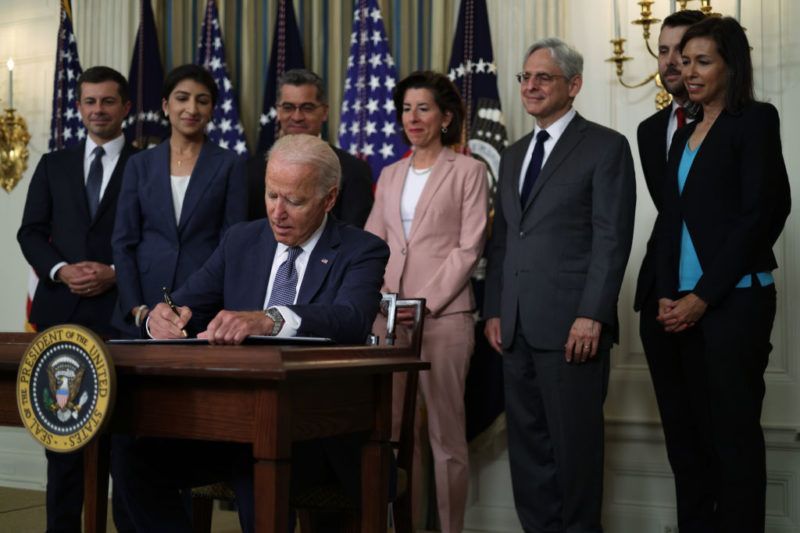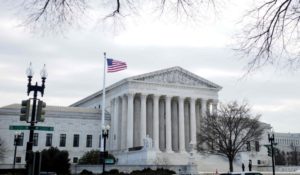
Antitrust experts from the University of Pennsylvania reflect on the possible consequences of the recent Biden executive order on competition.
President Joe Biden recently issued a sweeping executive order calling for 72 new actions by the federal government aimed at increasing market competition and strengthening antitrust enforcement.
In announcing his executive order, President Biden made it clear he was seeking to change the rules by which the U.S. economy operates: “We’re now 40 years into the experiment of letting giant corporations accumulate more and more power. I believe the experiment failed.”
To illuminate some of the potential consequences and implications of Biden’s executive order, the Penn Program on Regulation organized a panel discussion with three of the University of Pennsylvania’s leading scholars of antitrust law and policy:
- Herbert Hovenkamp, the James G. Dinan Professor at the University of Pennsylvania Law School and the Wharton School;
- Jonathan Klick, Professor of Law at the University of Pennsylvania Law School; and
- Ioana Marinescu, Associate Professor at Penn’s School of Social Policy and Practice.
The session was moderated by Cary Coglianese, the Edward B. Shils Professor of Law and Professor of Political Science and Director of the Penn Program on Regulation.
A key concern underlying the President’s executive order is the belief that most workers have not reaped the full rewards of America’s economic prosperity in recent decades. As Hovenkamp summarized at the start of the panel, despite the extraordinary earnings of many large U.S. firms, data show that “the share of labor in this growing profitability has actually gotten smaller and smaller, so that the welfare of labor has gone down.”
Part of the problem, Marinescu explained in more detail, is that the majority of U.S. labor markets “are plagued by a low level of competition”—meaning, there are relatively few employers competing to hire workers. This lack of competition leads to low wages.
“Employers have the power to pay workers less than their productivity, because workers … have little opportunity to go to other jobs and so are willing to accept being paid less.” And research by Marinescu and Hovenkamp suggests that a spate of corporate mergers in recent decades, by further reducing the number of firms hiring workers, only serves to exacerbate this problem. The executive order, by calling for beefed-up antitrust enforcement, therefore could yield economic benefits for workers.
“The President is seizing on the moment here to have an instrument in antitrust policy that has a chance to increase wages,” Marinescu said.
In announcing the executive order, Biden claimed that, between suppressed wages and rising prices, “lack of competition costs the median American household $5,000 a year.” Jonathan Klick, however, called into question this assessment that the average American has been left worse off, at least to this precise amount. The $5,000 figure cited by Biden, he observed, comes from the book The Great Reversal by economist Thomas Philippon, which received a lot of media attention by showing, for instance, that European consumers pay half of what Americans do for internet and phone services.
“The problem is,” Klick noted, “it’s an apples to oranges comparison. … When you drill down on the data, it turns out that the U.S. fee for internet services is for a much faster package, and so when you look at it on a megabit basis, U.S. consumers pay about half of what the folks in France and Germany pay.” More generally, he said, when one looks at the data from the Bureau of Labor Statistics, “U.S. consumers are actually consuming a lot more than they were” 40 years ago, suggesting that Americans are doing better today.
Klick also expressed concern about applying antitrust law more vigorously to affect a broader set of goals. Biden’s executive order, after all, came on the heels of both a major antitrust lawsuit filed against Google by 36 U.S. states and the District of Columbia as well as the approval by the House Judiciary Committee of significant changes to antitrust law targeting Big Tech firms. The Federal Trade Commission (FTC) has also recently announced that it is abandoning its exclusive reliance on the traditional consumer welfare basis for its antitrust decisions.
Expanding the basis for antitrust decision-making, Klick cautioned, can open the door to governmental actions taken “not for merit-based reasons, but more for political type reasons.”
Hovenkamp, while still supporting the consumer welfare basis for antitrust decision-making, sees some potential for applying antitrust law in new ways, especially in the regulation of Big Tech. “There are certain types of mergers that we’re not going after because our current merger guidelines don’t cover them, particularly mergers that are intended to eliminate competitors”—for example, Facebook buying Instagram—“or that entail other anticompetitive practices that are not collusive,” he explained.
Hovenkamp stated that he thinks that the U.S. already has effective tools such as the Sherman Act that can allow regulators to use “focused injunctions to stop the conduct without doing unnecessary harm … to the efficiencies and the network effects that have made the tech market so valuable.”
Part of what impressed Hovenkamp about Biden’s executive order is how moderate and un-political it seems. “While this was widely touted as a progressive document,” Hovenkamp noted, “the fact is that it preserves the centrality of economic concerns in antitrust. It never speaks of political power as an antitrust concern.” And it never uses the word “breakup” in reference to Big Tech.
Hovenkamp expects, however, that the FTC and other regulators will start deploying economic ideas that are “more interventionist and more based on imperfect competition models.”
Marinescu emphasized the practical problem of trying to expand federal antitrust enforcement with the limited resources that federal agencies have available. She maintained that much still could be gained for workers even with just a small commitment of additional resources from regulators, given that there has been “almost no enforcement” against anticompetitive labor practices to date.
“The marginal benefit of adding more enforcement in an area where you are doing zero or close to zero is likely to be very high, no matter what the budget constraints are,” she noted.
Beyond updating merger review guidelines to account explicitly for labor market effects, Marinescu argued that the FTC should crack down on the use of non-compete agreements, which prevent workers from moving into a new job with an organization in the same industry, and which have been imposed on many workers even in low-wage positions, such as in fast food.
One point of concern expressed by all of the panelists was the potential of President Biden’s executive order, in calling so expansively on agencies across the federal government to take action against anticompetitive practices, to generate conflict with state-level regulators. The executive order, for instance, directs the FTC “to do away with certain occupational licensing requirements” that unduly prevent workers from pursuing new opportunities. Occupational licensing, however, has traditionally been a state prerogative.
On this issue, as with the others raised by the panel, there will be much more to discuss in the years ahead as federal agencies move forward in trying to operationalize the 72 directives from Biden’s executive order. “We will definitely see more action in the months and years ahead—that is an unquestionable effect of the executive order,” concluded panel moderator Coglianese.
Andrew Coopersmith is the Managing Director of the Penn Program on Regulation.



